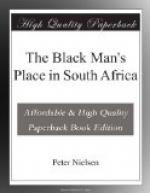If we believe that racial antipathy is caused by the feeling of jealousy that arises instinctively, so to speak, from man’s inner nature, then it is safe to say that it will last as long as the substance from which it springs, and as long as the racial difference which provokes it remains, but this belief is not firmly established in the general mind. The whites, as a whole, feel far from sure about the permanence of their cherished pride and prejudice of race; they are, more or less consciously afraid that the antipathy upon which they rely may become weakened and eventually dissipated by close contact of the two races in places where economic pressure has reduced both to the same level of life. We shall do well to remember the words of Renan when we try to estimate the truth of this matter, “La verite consiste dans les nuances,” for both estimates may be true; the racial instinct may have to yield here and there to the superior force of economic pressure, and may yet in the main prove powerful enough to prevent the contact that tends to render it of no effect.
The racial feeling which we are considering is undoubtedly much stronger at present in the whites than in the Bantu, but there is reason to believe that the awakening desire for racial self-assertion which we call pride of race will grow and increase in the Bantu as it has done in the Negroes in the Southern States of America, and elsewhere. General education, so far from hindering the growth of nationalism and racialism seems in some sort to subserve and foster that growth; witness the strident self-assertion of the newly-constituted little nations in Europe, and the cult of “Nationalism” in South Africa to-day. It is natural for birds of feather to flock together and screech together, and in the same way throughout mankind particular groups of people tend naturally to keep together and to marry among themselves separately from the rest of the community by which they happen to be surrounded, and this ethnic instinct, if so it may be called, is seen to operate even where, as among the Italian immigrants in America, there is no great racial difference between them and the Native-born inhabitants, and, much more markedly, in the Southern States of America where, according to a recent observer, the present tendency is not towards but away from miscegenation, so that the ultimate blending of colour is not likely to take place there in the course of nature.[23]
The normal Native man does not hanker after white women, and the normal Native woman is not, as a rule, anxious to mate with a white man, but this normal disposition is apt to be disturbed by the familiarity which is bred by the close contact that occurs in towns and other centres. It is not, therefore, safe to deny the possibility that with advancing industrialism in congested areas there will be some white women ready to marry or cohabit with Native men who are either in positions of relative superiority or in possession




